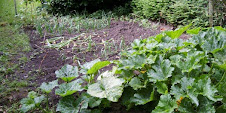During a typical, sunblushed, late-afternoon chat chez Debbie and Paul, we happened upon the notion of living by World War Two rations for a while. Our beer-fuelled discussions quite often take strange detours, and more times than not, any wild ideas remain forgotten amongst the ruins of our hangover, or postponed indefinitely. This one really caught our imagination though and after a small amount of internet research, asking around, and book hunting, we decided to give it a go.
It's difficult to pinpoint a reason why we wanted to do this, or why it even occurred to us in the first place. We're both a bit more self-indulgent than we'd like to be, I suppose, and for a while we've been trying to cut back on the luxuries but the desire for some maltesers or cheezy doritos in the middle of a film, a Battlestar fest or just at the end of a long day, is tricky to ignore when the One Stop shop 100 yards away is open until 11pm. So having a reason, albeit a completely contrived one, to say no to these impulses was quite attractive.
But I think we stumbled across the topic in conversation while thinking about the wasteful, lazy and abstract nature of many people's relationship to food in the twenty-first century. As a rule, we have been generally quite good in this respect, notwithstanding the odd takeaway and aforementioned habit to resort to maltesers and doritos. Paul grew up in a family that raised a lot of their own fruit and vegetables, as well as chickens for fresh eggs, and since moving to a house with a big garden in Coventry, I've been cultivating a small vegetable patch as well, having a decent crop of potatoes, onions, courgettes, leeks and broad beens for the last couple of years (see the pictures!!). And, by and large, we do a lot of creative cooking: my specialities include lasagne, various risottos, and Mexican food, while Paul is particularly good at stews, pasta dishes, roast chicken with lemon, and pizza (the less said about his attempt to make a lasagna-type thing with chinese noodles the better). We tend to get outraged in a fairly middle-class way when we watch those television programmes where Hugh Fearnley-Whittingstall or Jamie Oliver or someone is trying to teach a bunch of resistant, hostile people how to boil potatoes or gut a fish or simply try something new. In fact, I think we both feel a powerful attraction to their self-sufficient lifestyle (ironically made feasible by their pre-existing wealth); growing crops, raising animals, finding wild produce, generally being outside a lot, that kind of thing. So, we're certainly interested in many different aspects of food: most obviously, eating it, but also finding out where it comes from, how it is produced, how to cook it, ways to get the most out of it, and maybe even what it means to people. To us, it seemed that during World War Two, most people probably found out a lot of answers to these questions because they had to in order to stay healthy and survive. And following their lead, through choice rather than necessity, seemed like a good way to begin finding out more answers ourselves.
Subscribe to:
Post Comments (Atom)

No comments:
Post a Comment